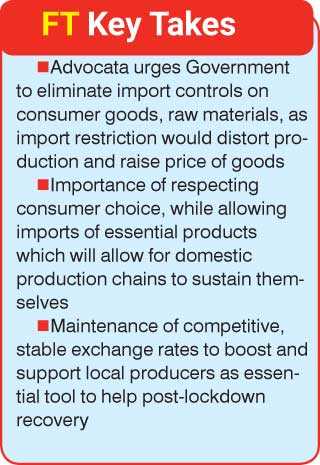Monday Feb 23, 2026
Monday Feb 23, 2026
Thursday, 9 July 2020 03:07 - - {{hitsCtrl.values.hits}}
The Advocata Institute yesterday said that extension of import controls for a further six months will impact the country’s growth prospects. 
According to the Extraordinary Gazette No 2182/10 of June 2020, import controls imposed by the earlier Gazette Number 2176/19 of 22 May 2020 were extended for another six months, commencing from 2 July 2020.
Advocata Institute said the Sri Lankan economy, battered by the impact of the curfew and global recessionary patterns, is in dire need of liquidity and access to credit. Downward pressure on the currency worsened the LKR’s position in the foreign exchange market, which in turn led to a significant foreign exchange shortage during the COVID-19 lockdown.
To protect the currency, the Ministry of Finance (MOF) announced import restrictions on consumption. Therefore by use of the above Extraordinary Gazettes, the import of vehicles, refrigerators, luxury goods, certain raw materials, fruits and vegetables have been further restricted. Considering the nature of the emergency, it would be acceptable to limit the import of luxury goods and vehicles temporarily, however import controls on consumer goods would be harmful and inflationary.
The Advocata Institute argued that such import restrictions will further hamper Sri Lanka’s growth prospects, and will disadvantage businesses that rely on imported raw materials.
As reported by the Central Bank, imported consumer goods only amount to 19.8% of total imports, while 57% of imports are intermediate goods for production. Therefore local manufacturers are already starting to experience the adverse effects of the import controls. One such key industry is the confectionery industry, which is experiencing a 340% special commodity levy on block fat and margarine. The industry is already impacted by increased taxes on palm oil and sugar, and is expected to experience an additional cost of Rs. 500 million to Rs. 600 million per month with import tax increases. The confectionery industry directly and indirectly employs over 600,000 people, while exporting to over 55 countries, bringing in $ 100 million in export revenue.
Advocata Institute said significant increases in the cost of production would make Sri Lankan products uncompetitive internationally, and domestically expensive for local consumers. The adverse effects of import restrictions will spill over onto the export sector, as a tax on restrictions of imports is a tax on exports. Further, the existing price stability in consumer goods is a result of existing stocks, when these stocks run out, prices of domestic goods will increase, leading to a reduction in welfare. This is especially impactful on lower-income groups, who rely on competition and cheap substitutes for essential products in order to sustain themselves. Additionally, the currency situation is likely to continue worsening, due to emphasis placed on consumer good suspension, instead of intermediate goods, which have more demand.